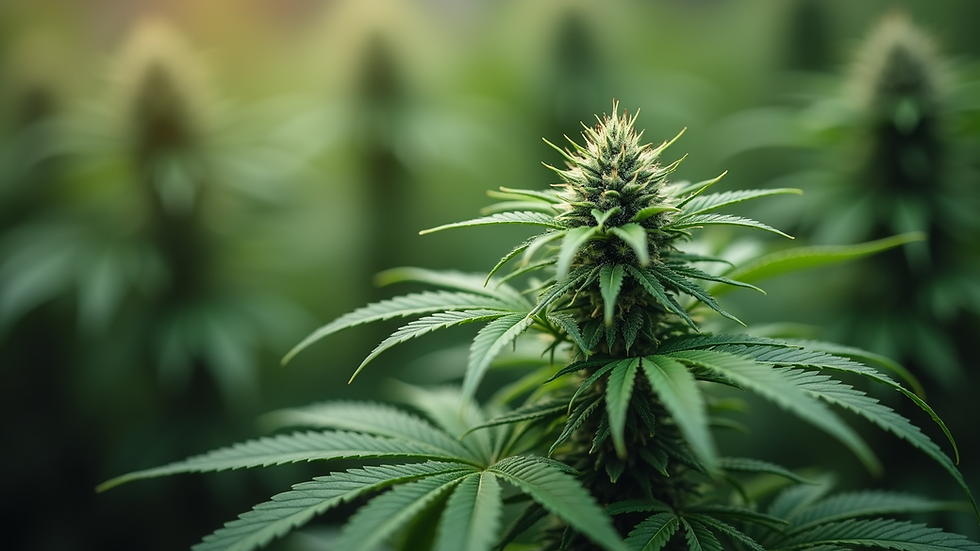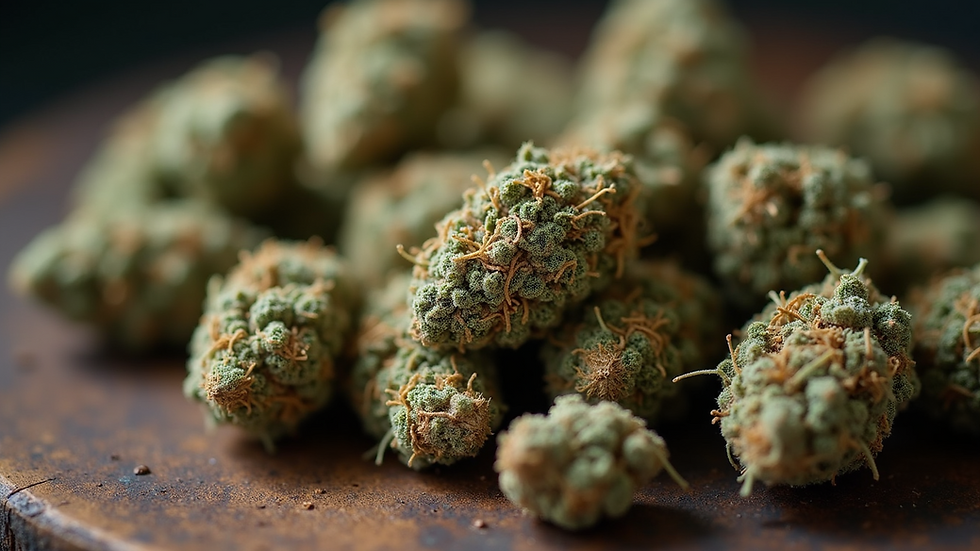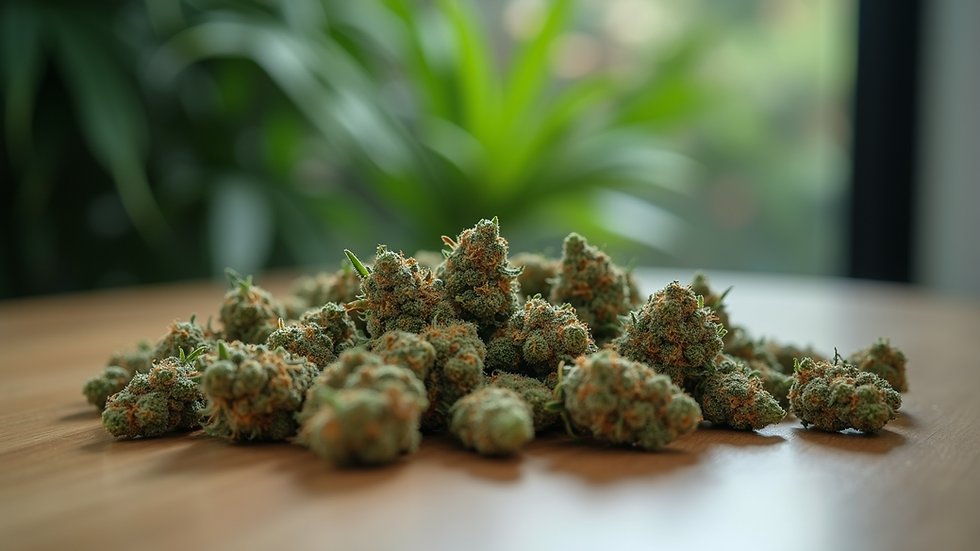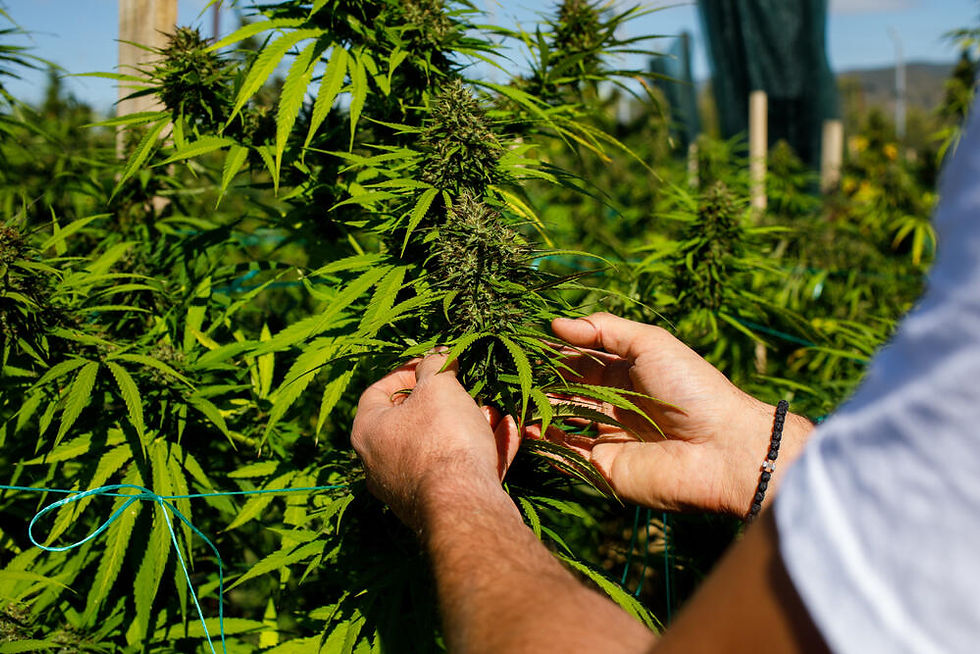Discover the Key Differences Between THCA and THC
- Smoke Central Hemp

- Jul 17, 2025
- 4 min read
In recent years, cannabis has gained increased attention in both medical and recreational contexts. With this interest come numerous compounds, including tetrahydrocannabinolic acid (THCA) and tetrahydrocannabinol (THC). Both of these compounds are popular, but they serve different purposes and affect the body in distinct ways. In this blog post, we will explore the key differences between THCA and THC, helping you understand their unique properties, effects, and uses.
THCA and THC Differences
At first glance, THCA and THC may seem similar due to their common origin from the cannabis plant. However, they differ significantly in their chemical structure and effects. THCA is the non-psychoactive precursor to THC, which means that it does not produce the "high" associated with cannabis use.
Before cannabis is heated or decarboxylated, it primarily contains THCA. When cannabis is consumed in forms that do not undergo this process, such as raw cannabis leaves or juices, the user can benefit from THCA's therapeutic properties without experiencing intoxicating effects.
On the other hand, THC becomes the primary compound when cannabis is ignited or heated. This transformation allows THC to interact with the brain's endocannabinoid receptors, resulting in various effects, including euphoria, enhanced sensory perception, and relaxation.

The Chemical Structure of THCA and THC
Understanding the baseline chemical structures of THCA and THC is crucial for recognizing their differences. THCA has a carboxylic acid group in its structure, which is what makes it non-psychoactive. The presence of -COOH (the acid group) in THCA must be removed to convert it into THC, which happens during the heating process.
The conversion process is known as decarboxylation. Once THCA is heated, the carboxylic acid group is released in the form of carbon dioxide, altering the molecule's structure and enabling THC to bind to CB1 receptors in the brain effectively.
Here's a simple representation:
THCA: C22H30O4
THC: C21H30O2
This slight difference in chemical structure is responsible for the vast differences in their effects on the human body.

How Much THCA Equals THC?
It is also worthwhile to understand how much THCA one would need to convert into an equivalent amount of THC. As a general rule, it is estimated that roughly 87.7% of THCA can be converted into THC upon decarboxylation.
For example, if you have 100 mg of THCA, you can expect to yield about 87.7 mg of THC after heating. This yield can vary based on the duration and method of heating (such as baking, vaporizing, or smoking).
In practical terms, if you're considering your intake of cannabis for its psychoactive effects, it's important to know the potency in both THCA and THC terms.

Therapeutic Benefits of THCA
While THCA itself does not produce intoxicating effects, research suggests that it may offer several therapeutic benefits. Some of the potential health benefits of THCA include:
Anti-inflammatory Properties: THCA is believed to have significant anti-inflammatory effects, which could be beneficial for treating conditions like arthritis and other inflammatory diseases.
Neuroprotective Effects: Research has suggested that THCA may possess neuroprotective properties, meaning it could safeguard brain cells from conditions like neurodegeneration.
Nausea Relief: Some preliminary studies have indicated that THCA may help manage nausea and vomiting, which could be especially useful for patients undergoing chemotherapy.
As of now, more research is needed to fully understand the breadth of THCA's benefits, but its potential shows promise for those seeking therapeutic alternatives.
Psychoactive Effects of THC
In contrast, THC is well-known for its psychoactive effects. This compound is primarily responsible for the euphoric sensation commonly associated with cannabis consumption. Some of the benefits and effects related to THC include:
Pain Relief: THC can be an effective option for those dealing with chronic pain conditions, as it interacts with the brain's receptors to provide relief.
Appetite Stimulation: Often referred to as "the munchies," THC can significantly stimulate appetite, making it helpful for individuals dealing with appetite loss or eating disorders.
Anxiety and Mood Regulation: Many users report that THC can help improve their mood, alleviate anxiety, and create feelings of relaxation, although it can also lead to heightened anxiety in some individuals.
Understanding how these two compounds differ enables consumers to make informed decisions about their cannabis use, depending on their desired effects.
Choosing Between THCA and THC Products
When considering whether to use products rich in THCA or THC, it's essential to evaluate what you're hoping to achieve.
For individuals seeking medicinal benefits without the psychoactive effects, raw cannabis products, such as juices or tinctures high in THCA, may be the ideal choice. These products can provide a variety of health benefits while avoiding any intoxicating feelings.
On the other hand, those looking for a psychoactive experience or relief from specific symptoms associated with conditions like chronic pain or anxiety may prefer products containing THC. These typically come in forms like edibles, oils, and concentrates.
Practical Recommendations:
For Therapeutic Use: Explore raw cannabis juices or supplements rich in THCA to enjoy its potential therapeutic benefits without any psychoactive effects.
For Recreational Use: Choose smoked or vaporized products that contain THC to experience relaxation and euphoria.
In deciding between the two, keep in mind your individual tolerance, needs, and desired effects from cannabis use.
Final Thoughts on THCA and THC Differences
As cannabis culture continues to evolve, understanding the distinctions between THCA and THC is critical for both medical and recreational users. Both compounds offer unique benefits and experiences, making it essential to know what you're consuming and why.
While the <https://www.smokecentralhemp.com/thc-vs-thca> discussion around THCA vs THC may seem complex, it boils down to their differing effects and therapeutic potentials. Whether you are interested in avoiding the high or seeking specific symbiotic benefits, being informed will lead you to the right decision for your needs.
Understanding these key differences will help you harness the full potential of cannabis for health and wellness.



